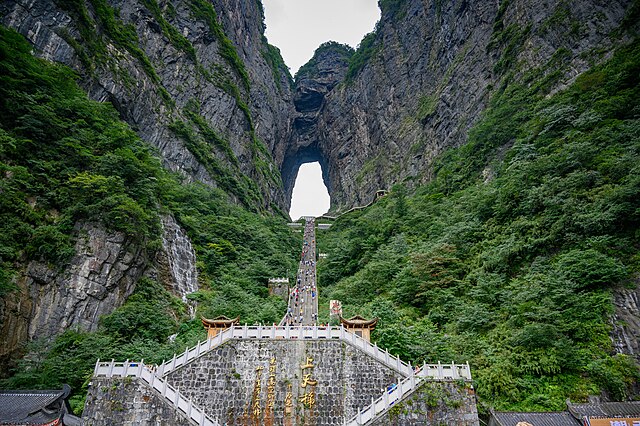
The Legend of Tianmen Mountain's Name
Tianmen Mountain, a towering peak piercing the sky, holds the title of being the earliest recorded mountain in Zhangjiajie's historical annals. Its imposing presence has captivated hearts and inspired awe for centuries, leading to a rich tapestry of legends and tales woven around its majestic slopes. Let's delve into the fascinating story behind this mountain's evocative name.
An Ancient Peak Known as Mount Songliang
During the Han dynasty, long before it earned its current name, the mountain was known as Mount Songliang. This moniker likely reflected its physical characteristics – perhaps its height, grandeur, or a distinctive feature now lost to time.
A Celestial Event and a New Name
The year was 263 AD, during the Three Kingdoms period. The sixth year of the Yong'an reign of Emperor Sun Xiu of Eastern Wu saw a momentous event that forever changed the mountain's destiny.
Legend has it that a section of Mount Songliang's sheer cliff face dramatically collapsed, creating a massive, gaping hole that resembled a giant doorway carved into the mountainside. This awe-inspiring natural phenomenon was interpreted as an auspicious omen by Emperor Sun Xiu. He saw it as a celestial gateway opening up, a clear sign from the heavens. In recognition of this event, the Emperor bestowed upon the mountain a new, auspicious name: Tianmen Shan, meaning "Heaven's Gate Mountain".
A Sacred Destination and a Flourishing Temple
Following this event and the mountain’s renaming, Tianmen Shan's legend grew. It became deeply intertwined with Taoism, a philosophy and religion that gained significant prominence during the Wei and Jin dynasties.
Taoism emphasizes living in harmony with the "Tao," the natural order of the universe. It places great importance on achieving immortality, often through meditation, self-cultivation, and connection with nature.
Tianmen Shan, with its newly formed "Heaven's Gate," became a powerful symbol in Taoist belief. The mountain was seen as a sacred site, a place where the boundary between the earthly realm and the heavens was at its thinnest. It was believed to be a portal to immortality, a place where devoted individuals could potentially ascend to the heavens.
| Feature | Significance |
|---|---|
| Tianmen Cave ("Heaven's Gate") | A physical manifestation of the celestial gateway, believed to connect Earth and Heaven. |
| Mountain's Height and Grandeur | Symbolized a path to spiritual elevation and closer proximity to the heavens. |
| Natural Beauty and Serenity | Provided an ideal environment for meditation, reflection, and pursuit of enlightenment. |
Pilgrims and seekers flocked to Tianmen Shan, hoping to draw closer to the divine. Atop the mountain, a grand temple was constructed - the Tianmen Shan Temple. This complex grew to an impressive scale, a testament to the mountain's religious significance and the devotion it inspired. Historical records describe it as having "three grand halls, six side chambers, with brick walls and iron-tiled roofs so vast they resembled a giant cauldron."
Tianmen Mountain Today
Today, Tianmen Mountain stands as a testament to the enduring power of nature and its ability to shape human beliefs and stories. While the Tianmen Shan Temple has seen periods of decline and reconstruction throughout the centuries, the mountain itself remains an enduring symbol of China's rich cultural and spiritual heritage. Its "Heaven's Gate" continues to inspire awe and wonder, drawing visitors from around the globe.
Q&A
Q1: What was Tianmen Mountain originally called?
A1: Before gaining its current name, Tianmen Mountain was known as Mount Songliang.
Q2: What event led to the name "Tianmen Shan"?
A2: In 263 AD, a section of the mountain's cliff face collapsed, creating a large opening that resembled a gateway. This was interpreted as a celestial sign and the mountain was renamed Tianmen Shan, meaning "Heaven's Gate Mountain."
Q3: Why did Tianmen Mountain become important in Taoism?
A3: The "Heaven's Gate" resonated with Taoist beliefs about immortality and connecting with the heavens. The mountain became a sacred site, believed to be a portal to the divine realm.